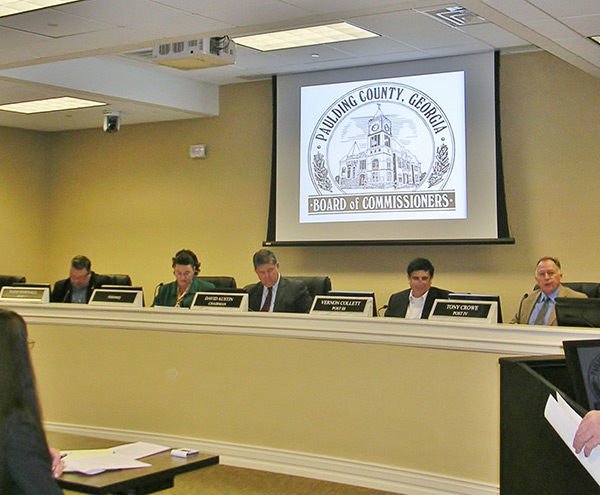Paulding water customers will pay higher rates to help fund the county’s Richland Creek Reservoir project, but reap the advantages in the long term says Kelly Comstock, the project’s chief engineer.

In their February 23 session Paulding Commissioners voted on rate hikes to water bills beginning in 2017 and also four agenda resolutions to accept updated Georgia Environmental Finance Authority funding to help fund the Richland Creek Reservoir project. (Photo: R. Grant) |
Comstock, along with County Finance Director Tabitha Pollard, recently addressed Paulding Commissioners regarding the upcoming rate schedule. According to Comstock, Paulding County residents will see an uptick in water bills for the next few years, but the savings to county water customers in the long term is significant. Ms. Pollard told commissioners in January that a household using 4,000 gallons monthly will see a rate increase of about $4 per month over five years to pay for the reservoir’s construction. The increase is proposed to begin in 2017, she said.
The county will oversee 8.75 percent annual increases for five years through 2021. However, Paulding ratepayers will see long-term savings past 2021 because current water provider Cobb County-Marietta Water Authority will likely continue its current 4 percent annual increase in rates for the next 20 years, she said. By implementing the RCR Program, over a 10-year period, rates would be less than if the reservoir was not constructed. And long term, by Paulding County being able to produce its own water source, Paulding County residents will save over $100 million in lower water rates.
County officials have secured $82.7 million in loans and grants from the state, but must find an additional $132.3 million to complete the project. In their February 23 session Paulding Commissioners voted with regard to the upcoming rate hikes and also approved four agenda resolutions to accept updated Georgia Environmental Finance Authority (GEFA) funding better adapted to the project.
“[It] restructures the loans with better terms that GEFA was offering...and it will allow us to just draw on one loan at a time so it gives more flexibility to the county,” Comstock explained.
County officials will also consider the pros and cons of U.S. Department of Agriculture low-interest loans for another piece of the funding versus traditional bonds, which would include a requirement for the county government’s “full faith and credit” backing for the loans, which requires establishment of a water authority and a tax increase to pay for any leftover costs.
Pollard also said advantages of using a federal loan rather than traditional bonds for funding included lower interest rates, the ability to borrow and pay interest on only part of what is ultimately needed, and a longer repayment period which could reduce costs by $1 million annually, she said.
But the commission likely will have to go to the bond market for the part of the funding not covered by the federal loan, she said. Comstock added that having the rate adjustment already established will help that process when the time comes. “Setting up the rate adjustment ahead of time sets us up to go to the bond market to be able to basically show we’ve got this in place [and] would allow for more confidence in the county being able to pay those bonds back, which should get us a better bond rate, so a better interest rate for the county,” he said.
The reservoir is designed to yield about 35 million gallons per day and will provide about 3.43 billion gallons of water storage to support Paulding County. Construction will likely begin later this year with completion expected in 2021. Paulding County has an agreement that runs until 2032 with Cobb-Marietta Water Authority, an independent state-chartered agency, which receives water from Lake Allatoona, a USCOE-controlled reservoir. Lake Allatoona has been the subject of multi-state, decades-long disputes over access and allocations, which made Paulding County vulnerable to supply restrictions.
Atlanta Regional Commission population projections show Paulding growing to 255,000 residents by 2040. Paulding County remains among the fastest-growing in the state. Among Georgia’s 159 counties, Paulding is the 14th largest.





















